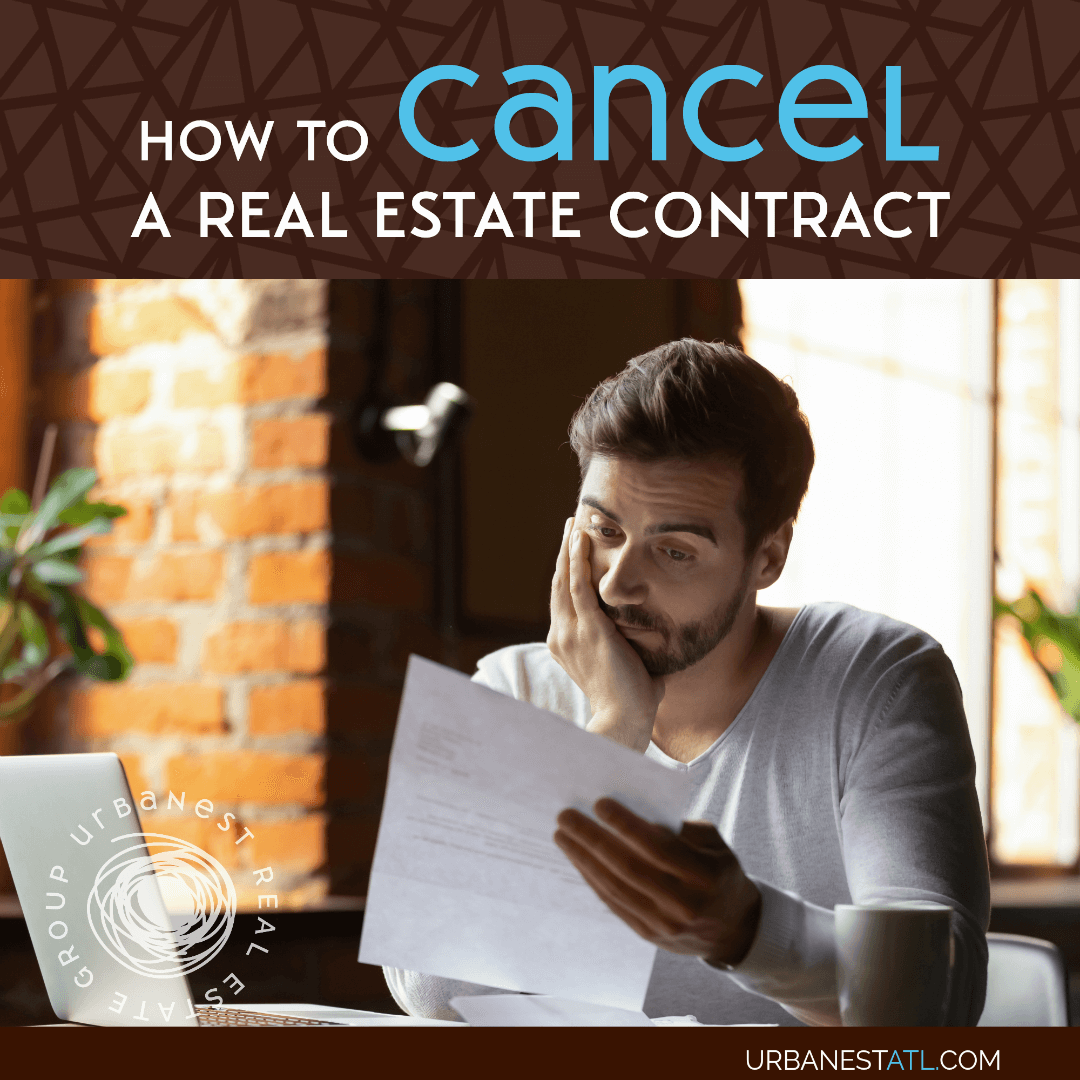Don’t want to buy the home after all?
Wondering How to Get Out of a Real Estate Contract?
It is possible, but terminating a Purchase & Sale Agreement (i.e. real estate contract) is different in each state and the rights of of the Seller versus Buyer may vary. We are going to explore the different ways both Buyers and Sellers can get out of your real estate contract in Georgia.
How Buyers Can Get Out of a Real Estate Contract
A large majority of the real estate contracts have several contingencies, meaning that the sale of the property is contingent upon certain situations to happen in order to get to the closing table. As a home buyer in Georgia, you are typically protected by the Due Diligence Period, the Appraisal Contingency and Financing Contingency. If you also need to sell your home, you and your agent may also make an offer that is contingent upon the sale of your current home. Let’s explore each contingency and how it will help you get out of the real estate contract if needed.
1) Due Diligence Period
During the Due Diligence Period, you can terminate the contract for ANY REASON here in Georgia. During this period, it is critical that you do the home inspection, negotiate any repairs (if needed), research the neighborhood, schools, commute times and anything else that you need to ensure that you are 100% comfortable moving forward with the purchase of the home. If you do need to terminate your Purchase & Sales Agreement, you and your Realtor must submit a Termination and Release Agreement before the end of the Due Diligence Period. The seller also needs to sign the agreement in order to receive a full refund of your Earnest Money. Please note: The length of the Due Diligence Period is negotiable, but typically ranges from 7 days to 14 days.
2) Appraisal Contingency
During this contingency period, your lender will submit a request to send a 3rd party appraiser out to the home. The real estate appraiser will tour the home and research recent comparable sales (usually nearby homes sold within the last 3 months) and provide an assessment of the home’s current value.
If the home appraises for less than the agreed-upon purchase price, there are three options:
1) The Buyer and the Seller renegotiate the contract price and terms in order to get the sales price down to the appraised value of the home. 2) The Buyer decided to make up the difference. For example, let’s say that the home appraised for $7,000 less than the purchase price. The lender will only give you a mortgage based on the appraised value of the home, so the Buyer will have to bring an additional $7,000 to closing — this is in addition to any closing costs and down payments. 3) If the Buyer and Seller aren’t able to reach an agreement and the Buyer isn’t able to bring the additional funds to closing, then as the Buyer, you can get out of the real estate contract — as long as you terminate the Purchase & Sales Agreement prior to the end of the Appraisal Contingency Period.
** If you do have to terminate the real estate contract, you should also get a full refund of your Earnest money (unless another agreement was in place).
3) Financing Contingency
The goal of the financing contingency period is to make sure that the Buyer is financially able to purchase the home AND the home qualifies for financing. In order to ensure that the home is approved for financing, it must appraise for the purchase price (or Buyer is willing to make up the difference) and on occasion, certain repairs need to be made to the home prior to closing. There are some other unique situations that arise, but these are the most common. If the mortgage lender doesn’t approve the loan, you must send the seller a Loan Denial Letter before the Financing Contingency Period ends in order to get out of the real estate contract and protect your Earnest Money.
4) Breach of Contract
If you don’t have any contingencies and/or the Due Diligence Period has ended, you can breach the contract. This is a rare occurrence, as the Buyer would typically lose their Earnest Money as well as any money spent on inspections and appraisals. If you were in breach of contract, the seller could potentially sue you for damages or “specific performance,” meaning that the court could rule that you must do what you agreed to in the real estate sales contract and purchase the home.
TIP FOR BUYERS: Every Purchase & Sales Agreement is unique, so when you and your real estate agent are writing the contract, make sure they share all the ways that your Earnest Money will be protected and if needed, how you can get out of the real estate contract.
How Homeowners (Sellers) Can Get Out of a Real Estate Contract
As a home seller in Georgia, your options for terminating a home sales agreement are a bit more limited. There are a few scenarios that could cause the contract to terminate:
1) Home Repairs
If you decide that you do not want to sell your home and the buyer requests that you do $1,500 in-home repairs (for example), you can simply say “no”. If the buyer decides they don’t want the home unless the repairs are made, they may decide to exercise their right to terminate the contract during the Due Diligence Period.
2) Issues with Appraisal
If the home appraises for less than the agreed-upon purchase price and you don’t agree to reduce the price — and the buyer is not able to make up the difference — then the Buyer can terminate the contract.
3) Contract Loopholes
If the seller really wants/needs to get out of a real estate contract, their real estate broker, agent or attorney may be able to find loopholes in the contract that make it invalid. This is rare, but may be a possibility.
4) Don’t Attend the Closing
Some homeowners decide to stop communicating with the buyer and/or don’t show up for the closing in order to avoid selling their home. This is also considered a breach of contract and is NOT A STRATEGY you should use, as it could result in a lawsuit and/or you (the seller) could be held liable for all the real estate commissions.
 A lot to consider, right?
A lot to consider, right?
As you can see, there are a lot of variables in every real estate transaction. It is crucial that both the home seller and the buyer fully understand all the details and timelines of the real estate contract before it’s signed by all parties. Make sure that you have a knowledgeable and experienced real estate agent or broker by your side. They can protect you in one of the largest transactions you will ever make.
When you are ready to buy or sell a home, we highly recommend that you interview three local REALTORS in order to find the one that will help you negotiate a contract that protects your best interests. If you have any questions about the home buying or selling process, please reach out anytime. Call 404-205-8800 or email – whatever works best for you.


